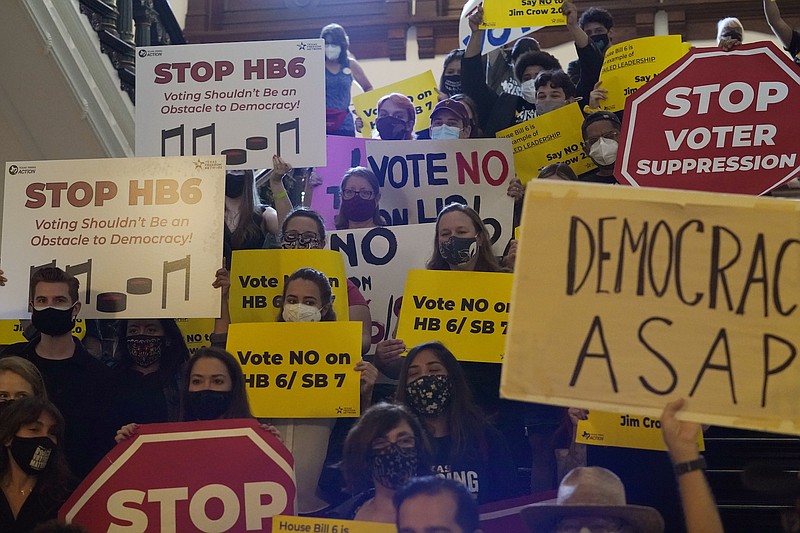FORT WORTH, Texas - Count me among the cohort of conservative writers who tired quickly of the claims that the 2020 election was illegitimate.
It wasn't. Allegations of massive, coordinated, multi-state fraud fell flat despite months of investigations and lawsuits.
But Donald Trump's failure to prove an election conspiracy against him does not mean election fraud does not occur enough to affect elections. Nor does it mean that standardizing election procedures and restoring pre-pandemic voting practices are unnecessary or suppressive.
That's what some Texas lawmakers want you to believe. They have dubbed the Texas election reform measure "voter suppression," calling it "Jim Crow 2.0," a name belied by the bill's actual content.
House Democrats even walked out on the chamber to deny Texas Republicans the quorum necessary to pass it.
They did so at their own folly since the bill could come back with a vengeance in the special session.
But they also undermined their own credibility in criticizing as "an assault on democracy" a bill that with a little tweaking, is largely unobjectionable.
To start, it would return voting procedures to pre-COVID rules. Drive-thrus and voting in tents were always intended to be temporary, as was 24-hour early voting, which was allowed in certain Texas counties.
The bill would require voters to request their own mail-in ballots and prohibit public officials from sending out unsolicited ballots or applications.
It would require voters to write a driver's license number or other personal identifier on absentee ballots, which fulfills the existing ID requirement for in-person voting.
It would increase penalties for ballot harvesting, a tactic that disproportionately harms elderly and vulnerable individuals, and would require information from the individual assisting the voter to protect against assistance fraud.
It would ensure ballot security by requiring a paper trail and live-streaming of vote-counting for larger counties.
And it would standardize practices such as times the polls are open. That would minimize confusion and, in some counties, would actually increase the amount of time polls are required to be open on weekdays and weekends.
The bill's most worrisome provision, apparently included in error, would prevent polling places from opening before 1 p.m. on the last Sunday of early voting. That could legitimately be viewed as attempting to reduce turnout from Black churches and should be removed. Indications are that it will be.
Republican-led election-security efforts - even mostly benign ones - are always cast as suppressive. Saying so makes for better cable TV, I suppose.
But there are elements of this bill that Democrats should overwhelmingly support, not in spite of but because of the last election cycle.
Live-streaming of vote-counting, for example, wouldn't only provide greater transparency on the sometimes mysterious process, it would potentially allow Democrats to push-back on claims of voter fraud by giving them actual footage of what is, or is not, happening.
The same is true of the voter assistance protections. Democrats worry over access for elderly and vulnerable populations that we know are susceptible to manipulation; they should enthusiastically support efforts to ensure the integrity of their votes, as well.
Republicans have their own demons to overcome when it comes to election reforms. They would do well to remember that ballot access and integrity are not opposing forces.
The 2020 election proved that Republicans can do better among minority groups - look at Florida or the counties on Texas' southern border - and that expanding the electorate, instead of just securing it, is a pathway to victory.
In the post-Trump/post-pandemic era, there are lots of reasons to consider how election processes could be improved to do both.
With a special session coming, it's not too late for that to happen in Texas.
Fort Worth Star-Telegram
